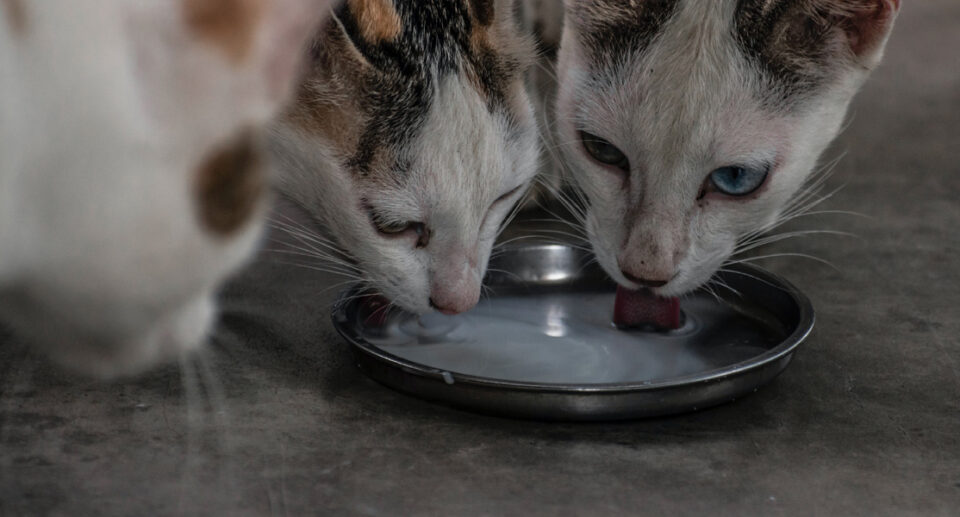How to Feed Kittens

Choosing the right pet food for your puppy or kitten
Every year, more than eight million tons of pet food are manufactured under 15,000 different brand names. How do you ever decide what’s best for your puppy or kitten? Giving food that’s closest to your pet’s natural diet is the best option. You should feed your puppy or kitten pet food specifically formulated for puppies or kittens.
Growing puppies and kittens
A puppy’s or kitten’s weight should double or triple during the first weeks of life. Milk from the mother dog (dam) and mother kitten (queen) is ideal for puppy and kitten growth. If the mothers cannot provide enough milk, puppy or kitten milk replacer is the ideal supplement.
Key facts about feeding puppies and kittens
- Canned or dry commercial pet food that is saturated with milk replacer is recommended for feeding unweaned puppies and kittens.
- Weaned puppies and kittens can be fed regular puppy food or kitten food.
Tips on weaning puppies from their mother
Puppies need two times more calories per pound than adult dogs need. For newborn puppies, calories are provided by the mother’s milk or by milk replacer. At 3-4 weeks of age, puppies can be supplemented with a small amount of canned or dry commercial food that is saturated with milk replacer. Tiny puppies play with their food and need to be cleaned after they eat.
Most dams suckle their puppies until they’re 7-8 weeks of age, gradually decreasing the time the puppies are allowed to nurse. With this natural weaning process, by 7-8 weeks of age, puppies obtain 80-90% of their nutrition from supplements, and 10-20% from the dam. Puppies need 25-30% of their diet to be protein.
A puppy’s weight should double or triple during the first weeks of life, then continue to gradually increase to the adult weight. Small breed dogs, whose adult weight is 20 pounds or less, reach their adult weight between 9-12 months of age, but large breed dogs don’t reach their adult weight until 2 years of age. The size and weight of an adult dog is not determined by how quickly he or she grows, so feeding too many calories will not make your dog maximum size. In fact, feeding too many calories harms your pet. Your pet will reach a maximum size determined by genetics and nutrition.
When growing puppies receive too many calories, and too much calcium, they develop bone disease and arthritis including hypertrophic osteodystrophy, osteochondrosis, and hip dysplasia. Because too many calories and too much calcium cause the bones to grow improperly, these dogs have painful legs and joints, lameness, and malformed bones. Sometimes these signs appear to be rickets, which is a deficiency of calcium, but they are actually the opposite problem. If puppies with osteodystrophy, osteochondrosis, or the tendency to hip dysplasia are supplemented with calcium, their problems become more severe and their bones may be permanently damaged.
With any puppy, but especially puppies of the large and giant breeds, feeding so that the puppy grows slowly is the way to go. Do not overfeed.
Weaned puppies should be fed four times a day until three months of age. If puppies are growing properly and gaining weight, reduce feeding to three times a day. After six months of age, feed puppies twice a day. If possible, avoid leaving your puppy’s food down all the time because this allows the antioxidants, fatty acids, and vitamins in the food to oxidize so that your puppy receives less of the nutrients he or she needs and that you’ve paid for. Gradually introduce a variety of puppy foods and textures so your puppy will mature into an adult willing to eat a variety of healthy foods.
Canned or homemade pet food diets are closer to the natural diet that dogs evolved eating and may be healthier than dry diets for many dogs. If feeding dry dog food is most suitable for you, supplement your growing pet with small amounts of sardines, yogurt, mashed sweet potato, spinach, and pureed vegetables.
Tips on weaning kittens from their mother
Kittens need 2-3 times more calories per pound than adult cats need. For newborn kittens, all the calories are provided by queen’s milk or by milk replacer. At 3-4 weeks of age, kittens can be supplemented with a small amount of canned or dry commercial food that is saturated with milk replacer. Tiny kittens play with their supplemented food and need to be cleaned after they eat.
Most queens suckle their kittens until they are 7-8 weeks of age, gradually decreasing the time the kittens are allowed to nurse. With this natural weaning process, by 7-8 weeks of age, kittens obtain 80-90% of their nutrition from supplements, and 10-20% from the queen.
Your kitten’s weight should double or triple during the first weeks of life, then continue to gradually increase to the adult weight between 9-12 months of age.
Weaned kittens should be fed four times a day until three months of age. If kittens are growing properly and gaining weight, reduce feeding to three times a day. After six months of age, feed kittens and adult cats twice a day. If possible, avoid leaving your kitten’s food down all the time because this allows the antioxidants, fatty acids, and vitamins in the food to oxidize so that your kitten receives less of the nutrients it needs and that you’ve paid for. Gradually introduce a variety of kitten foods and textures so your kitten matures into a cat that’s willing to eat a variety of healthy foods. At least 1/3 of the diet should be protein.
Canned or homemade diets provide moisture that helps prevent kidney and bladder problems and may be healthier than dry pet food diets for many cats.





